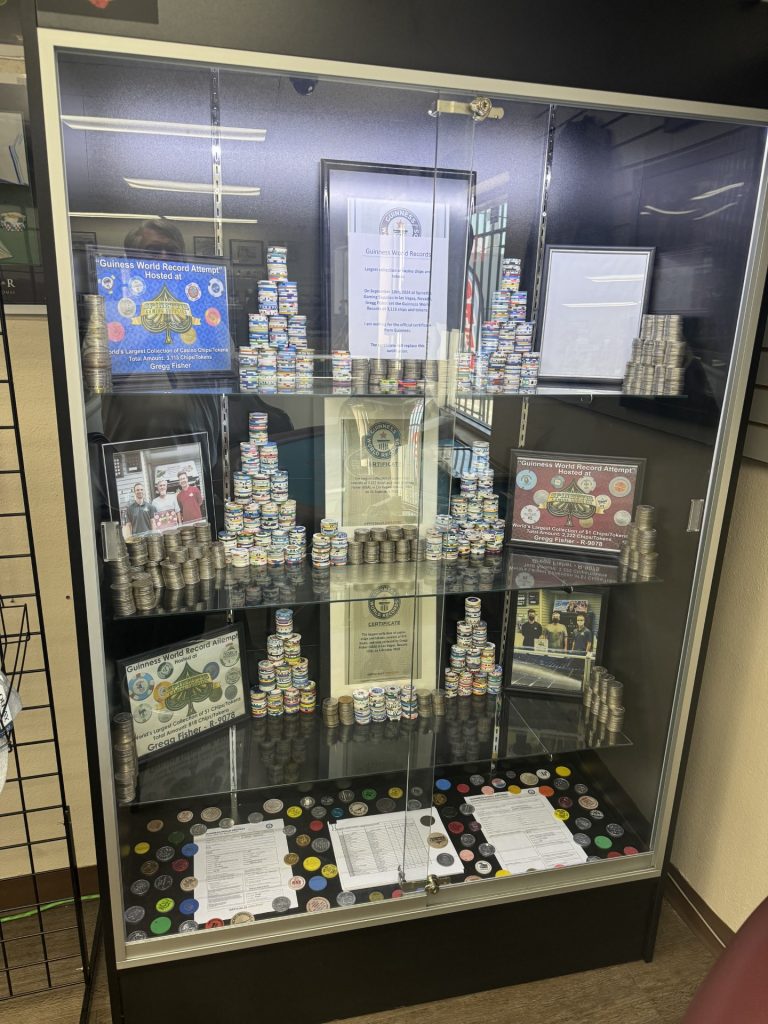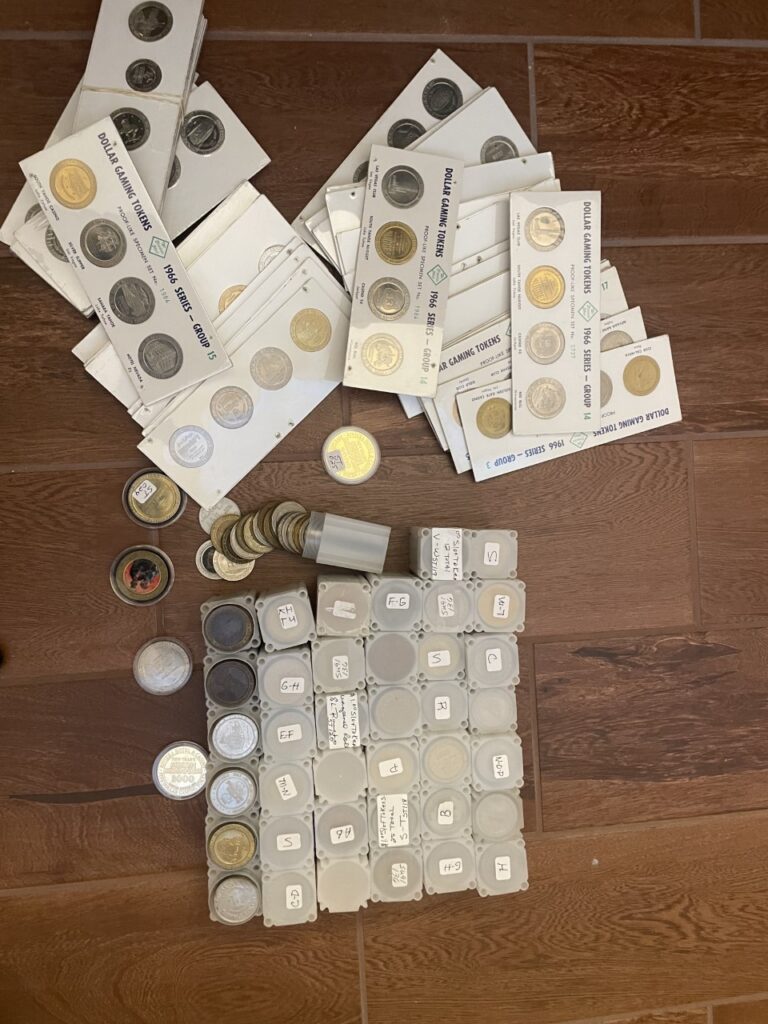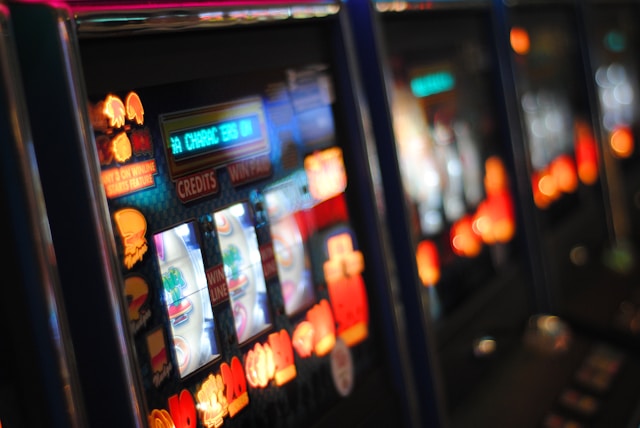 September 29th 2024 Update: Yes, Gregg’s at it again. At a Guiness World Records Event in October 2024 at Spinetti’s Gaming Supplies he’s again flexed his casino chip world record muscles upping his 2222 items record to a dizzying 3113 chips. The event was open to the Vegas with part of this special collection on display
September 29th 2024 Update: Yes, Gregg’s at it again. At a Guiness World Records Event in October 2024 at Spinetti’s Gaming Supplies he’s again flexed his casino chip world record muscles upping his 2222 items record to a dizzying 3113 chips. The event was open to the Vegas with part of this special collection on display
On multiple occasions in the past we have highlighted Las Vegas based collector Gregg Fisher’s casino chip and token collecting achievements. Such passion for a hobby or interest certainly stands out from the crowd.
We were previously happy to now report that he had once again outdone himself with a world record consisting of ‘The largest collection of casino chips consists of 2,222 items (see above, now beaten!), achieved by Gregg Fisher (USA) , in Las Vegas , Nevada, USA, on 26th September 2021’.
Achieving a Guinness World Record is far from a formality and involves crossing more t’s and dotting more i’s than you could ever imagine. Impressive in its own right, this now makes Gregg a two time Guinness world records holder! It just goes to show what can be achieved through hard work and determination.
January 1st 2023 update… Long time friend of ths site, Gregg has contacted us with the record entry as featured in the 2023 Guinness Book of World Records. He added that only 10 percent of records get into the book, so it really is quite some achievement!

Update: Stop the press. Gregg has informed us that he’s now purchased a collection of 3,500 to 4,000 pieces (some pictures below). Now that’s dedication to a cause!


2025 update: On 17th March 2025 I received personal notification from Gregg that his 3113 casino chip record is now official!
 Gamblers are often met with suspicion. If you are in the business of selling you may be met with ridicule or haters. If you want a social media following, then you will need a thick skin because you will be tarnished with the same brush as a million ‘prodigies’ who failed before you. True, some gamblers are liked more than others but it’s one subject that’s made for problems. In truth, it is a good reason to keep your name, personality and opinions to yourself. Fame comes at a cost. And bar a few professional poker players I don’t think fame is a word most professional gamblers achieve.
Gamblers are often met with suspicion. If you are in the business of selling you may be met with ridicule or haters. If you want a social media following, then you will need a thick skin because you will be tarnished with the same brush as a million ‘prodigies’ who failed before you. True, some gamblers are liked more than others but it’s one subject that’s made for problems. In truth, it is a good reason to keep your name, personality and opinions to yourself. Fame comes at a cost. And bar a few professional poker players I don’t think fame is a word most professional gamblers achieve.
You have more chance of becoming infamous.
I say this with regard to Mikki Mase, the US professional gambler who has been something of a social media revelation over the last three or four years. His distinctive tattooed appearance and reference to making $30M from his love of baccarat and poker have seen him ascend a higher level of fame. Mase said he was naive to social media when appearing on one YouTube channel and asked about every aspect of his life when he said prior to being interviewed that he wanted the conversation kept to gambling. In fact, he said it took him 18-months to put that interview behind him with haters knocking his reputation. Any gambler who says they have won a fortune and have reverse engineered how the casinos cheat punters out of money will have to battle through a depth of naysayers. It’s hardly surprising. People will always question how anyone can defy the house edge. Perhaps on poker, which is skill based, but baccarat doesn’t leave that much room to manoeuvre.
Mikki Mase is a fascinating character and I tend to believe his story. He said himself that he got lucky in that first year or two but then thought about his process and worked to understand how to beat the casino. Once again, the haters thought this was a scam or just pie in the sky. However, it isn’t beyond the realms for a gambler, who bets big money, to make many millions. The difficulty for most is keeping hold of the cash.
What I like about Mikki is his character. He is clearly intelligent and knows a lot about life which he puts down to a troubled upbringing, mostly due to his adventurous and creative mind. He is wise beyond his years and he has something about him – a touch of mystery which I’m sure he wishes he had kept even closer to his chest. His rapid rise to fame via social media has seen him meet and partner the most famous names often helping them win big at the casino. He has made a lot of money but wisely says the biggest problems in life cannot be resolved with money. He has been involved in the acting world and its something he enjoys. In addition, he has helped with many charities such as building a school and chatting and feed the homeless in Las Vegas.
I have seen a lot of professional gamblers and Mikki Mase has that x-factor. His appearance catches the attention and his story takes you on a journey of wonder. However, he also has is a heart and soul. He has gone out of his way to be transparent about his winnings even though there will always be someone who knock him. By all accounts he has nothing to sell. So it makes me consider he is someone who is simply enjoying fame and fortune. He says he wants to tell people they shouldn’t gamble. I don’t hear many professional gamblers say that and it goes a little deeper than the many self interested lonesome characters who are akin to spin doctors.
It’s interesting to consider why he wanted to be known but I guess with his winning story it was certain people would be interested in interviewing him and perhaps once the genie comes out of the bottle it is difficult to put it back in.
I don’t think he is someone to have too many regrets on the fame aspect and I for one would enjoy seeing and hearing more of this fascinating man.
His story on social media has been hard and fast. He has achieved equal measures of amazement and scepticism. He has fought the tide of vitriol to find numerous fans to fight his corner and proclaim his success.
He’s someone we will be hearing much more about and I am looking forward to enjoying every last word.
Out of the tens of thousands of casino games ever created, it’s natural that a few of them would share some similar features. Apart from the classic bell and cherry symbols common to so many of the ‘fruit machine’ slots, certain game features have managed to jump across themes and developers. Here are some of the most prolific features that you can find across slot libraries.
Megaways
There are few slot features out there quite as famous as Megaways. It has hopped between developers and themes, being applied to some of the biggest and most famous slot series. Enough people wanted to play the Temple Tumble slot or the Gonzo’s Quest slot that these became natural choices for extra entries in the series, and both of these classics were among the first to get a Megaways version.

The system essentially works by randomising how many symbols could appear on each reel with each spin, and removing any specific paylines. It means that on any particular spin, the number of winning lines can vary between a few hundred to over 100,000. It adds a huge amount of excitement for players as the higher amount of lines means there’s a much higher win potential on that spin.
Slingo
By comparison to Megaways, the Slingo mechanic is a far less flashy feature but has proven just as popular among players. It has been attached to a number of big slot series such as Money Train and Fire & Ice, bringing a touch of bingo gameplay to each one, and has even been used for major game show franchises like Deal or No Deal.
A game of Slingo essentially is a bingo card where instead of having a single number drawn each time, each space on the card spins like a slot reel and gets marked off if the number matches. The player gets a set number of spins at the start to try and fill as many lines on the card as possible, and can then buy some extra spins afterwards to try and mark off any remaining gaps.
Jackpot King
The Jackpot King network is a massive system connecting dozens of games across many different major casino sites. It is a progressive jackpot system where contributions to the jackpot are made by every player playing any linked game from anywhere in the world. This means that the prizes are always rising unless someone actually wins, and the top tier of jackpot, appropriately called Jackpot King, regularly reaches into the millions of pounds.

While the odds of winning one of the Jackpot King prizes are naturally lower than winning on the regular games themselves, adding it as a possibility on top of the existing slot adds a whole other level. More than a few big slot titles like Fishin’ Frenzy, Luck O’ The Irish and the slot adaption of the Ted movie have had the Jackpot King treatment already.
There are plenty more big brand mechanics out there to discover. Just remember though that if you see one of these big names attached to a game, then it’s a mark of quality for both that and the original.
Out of the thousands of slot games out there in the world, a good number have managed to become instantly memorable to players, but only a handful have managed to have real staying power. Slots that make a big impression tend to keep coming back for more, and today we’re looking at those series of slots which have become legendary amongst fans.
The ‘Dead’ Series
We’re starting with the biggest name in the industry, referred to as the ‘Dead’ series despite many of the more recent titles not featuring the name. It’s drawn from the original Egyptian-themed Book of Dead slot with lead character Rich Wilde, who either features in each slot in the series or has a relative in his place.

The original slot has proven enduringly popular, and many casino sites use it as one of their prime choices for bonuses and offers. If you log on to the online casino at Paddy Power Games or any other major site, you’re likely to see Rich Wilde featured somewhere with an offer. That popularity has led to more than a dozen entries in what is probably the most famous slot series ever.
The Age of the Gods Series
Sticking with the theme of ancient magics and treasures, the Age of the Gods series has become the go-to for slots connected to gods and mythology of all kinds. Originally starting out with the basics of Greek mythology, you can now find titles connected to all the most famous names like Zeus and Hades as well as series entries featuring Egyptian and Norse pantheons amongst others.
What has proven popular amongst players is that the series covers every type of slot out there, from low to high volatility, progressive jackpots, multiple free spin modes and a wide variety of maximum win limits. Essentially, no matter what mythology you’re looking for or what type of slot you want, there’s something here.
The Big Bass Bonanza Series
On the opposite end of the scale of grandeur and drama, our third famous slot series is all around a great outdoor pastime. The Big Bass Bonanza series is, as the name suggests, where the prizes come in the shape of fish of all kinds across 15 separate backgrounds from blizzards to secret missions to the hostile waters of the Amazon Rainforest. There are even a couple of Megaways options in the full lineup, which is a hallmark of a big series.

The popularity of the series comes from the unique free spins modes inside each edition. While the exact mechanics are a little different between each title, the core is always about cash collectors and building up a streak to get more spins and usually multipliers too. The fact that the developers, Pragmatic Play, have managed to find so many twists on that formula is nothing short of impressive.
With new slots being crafted all the time, it’s a matter of ‘when’ and not ‘if’ we get the next huge series. Odds are though, the entries above are going to be in the mix for a long time as well.
